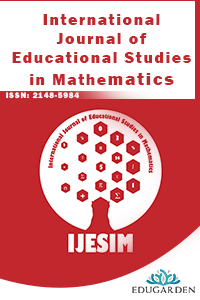An Investigation of the Questions Prepared by Pre-Service Middle School Mathematics Teachers on Fraction Concept
An Investigation of the Questions Prepared by Pre-Service Middle School Mathematics Teachers on Fraction Concept
Knowledge of assessment is considered as a dimension for professional knowledge of teachers (Magnusson, Krajcik, & Borko, 1999) since assessment and measurement of teachers’ knowledge is vital for quality issues in education. For this reason, the questions prepared by pre-service elementary mathematics teachers on fractions were investigated in the current study in order to observe pre-service elementary mathematics teachers’ knowledge of assessment in mathematics education based on fraction concept. By investigating the questions prepared by pre-service teachers, the quality of questions and the competency of teachers for preparing appropriate questions based on particular objectives were evaluated. 34 pre-service middle school mathematics teachers (3rd grade) were participated to the study. Case study design was employed and data was analyzed by the use of qualitative data analyses techniques. The tasks were investigated under three categories, knowing, applying, and reasoning based on cognitive domain framework (Mullis & Martin, 2013). Results show that pre-service teachers prepared traditional tasks in general. That is, the questions included routine mathematical operations and procedures. Therefore, they were classified to knowing and applying categories. In general, routine mathematical tasks were preferred by pre-service teachers rather than non-routine mathematical tasks which require reasoning level abilities.
___
- An, S., Kulm, G., & Wu, Z. (2004). The pedagogical content knowledge of middle school, mathematics teachers in China and the US. Journal of Mathematics Teacher Education, 7(2), 145-172.
- Ball, D. L. (1991). Research on teaching mathematics: Making subject-matter knowledge part of the equation. Research on Teaching Mathematics, 2, 1-48.
- Ball, D. L., Thames, M. H., & Phelps, G. (2008). Content knowledge for teaching: What makes it special? Journal for Teacher Education, 59(5), 389–407.
- Bright, G.W., Behr, M.J., Post, T.R. & Wachsmuth, I., (1988). Identifying Fractions on Number Lines, Journal for Research in Mathematics Education. 19(3), 215-232.
- Crespo, S. (2003). Learning to pose mathematical problems: Exploring changes in pre- service teachers’ practices. Educational Studies in Mathematics, 52(3), 243–270.
- Dwyer, C. A. (1998). Assessment and classroom learning: Theory and practice.Assessment in Education, 5(1), 131-137.
- Elbaz, F. (1983). Teacher thinking. A study of practical knowledge: Croom helm curriculum policy and research series. New York, NY: Nichols Publishing Company.
- Graeber, A. O., Tirosh, D., & Glover, R. (1989). Preservice teachers' misconceptions in solving verbal problems in multiplication and division. Journal for Research in Mathematics Education, 20(1), 95-102.
- Hill, H. C., Sleep, L., Lewis, J. M., & Ball, D. L. (2007). Assessing teachers' mathematical knowledge. In F. K. Lester (Ed.), Handbook for research on mathematics education (2nd ed) (pp. 111-155). Charlotte, NC: Information Age.
- Kahan, J., Cooper, D., & Bethea, K. (2003). The role of mathematics teachers’ content knowledge in their teaching: A framework for research applied to a study of student teachers. Journal of Mathematics Teacher Education, 6(3), 223–252.
- Krauss, S., Brunner, M., Kunter, M., Baumert, J., Blum, W., Neubrand, M., & Jordan, A. (2008). Pedagogical content knowledge and content knowledge of secondary mathematics teachers. Journal of Educational Psychology, 100(3), 716-725. doi: 10.1037/0022-0663.100.3.716
- Magnnusson, S., Krajcik, J., & Borko, H. (1999). Secondary teachers’ knowledge and beliefs about subject matter and their impact on instruction. In Gess-Newsome, J. and Lederman, N.G. (Eds). Examining Pedagogical Content Knowledge (pp. 95-132). Dordrecht: Kluwer Academic Publishers.
- Ministry of National Education [MoNE]. (2013). Ortaokul Matematik Dersi 5, 6, 7 ve 8. Sınıflar Öğretim Programı [5th, 6th, 7th, and 8th Grade Middle School Mathematics Curriculum]. Ankara: Milli Eğitim Basımevi.
- Mullis, I.V.S. & Martin, M.O. (Eds.) (2013). TIMSS 2015 Assessment Frameworks. Retrieved from http://timssandpirls.bc.edu/timss2015/frameworks.html.
- Pesen, C. (2008). Kesirlerin sayı doğrusu üzerindeki gösteriminde öğrencilerin öğrenme güçlükleri ve kavram yanılgıları [Learning difficulties and misconceptions of students for the representation of fractions on numerical axis]. İnönü Üniversitesi Eğitim Fakültesi Dergisi, 9(15), 157-168.
- Shulman, L. S. (1986). Those who understand: Knowledge growth in teaching. Educational Researcher, 15(2), 4-14.
- Tichá, M.& Hošpesová, A. (2009). Problem posing and development of pedagogical content knowledge in pre-service teacher training. Proceedings of CERME 6 (pp.1941-1950). Lyon, France.
- Toluk-Uçar, Z. (2009). Developing pre-service teachers understanding of fractions through problem posing. Teaching and Teacher Education, 25(1), 166-175.
- Yin, R. K. (2013). Case study research: Design and methods (5th ed.). Thousand Oaks, CA: Sage publications.
- Yayın Aralığı: Yılda 4 Sayı
- Başlangıç: 2014
- Yayıncı: Ercan MASAL
Sayıdaki Diğer Makaleler
